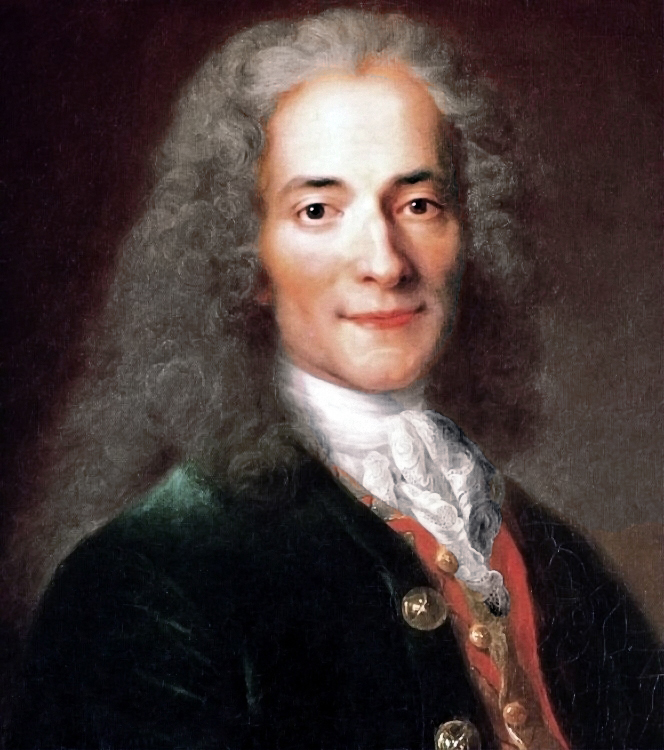Voltaire híres idézetei
Voltaire Idézetek az emberekről
Fordította: Jékely Zoltán
Idézetek verseiből
Voltaire Idézetek Istenről
Voltaire idézetek
„Nem értek egyet azzal, amit mondasz, de halálomig harcolni fogok azért, hogy mondhasd.”
A mondás Evelyn Beatrice Halltól származik, aki a Voltaire-ről szóló könyvében idézet formában ezzel a mondattal foglalta össze az „Esszé a Toleranciáról” című mű hozzáállását, melyben Voltaire azt írja: „Gondolj magadra, és hagyd meg másoknak is a jogot, hogy ugyanígy tegyenek.”
Neki tulajdonított, nem tőle származó idézetek
Fordította: Jékely Zoltán
Idézetek verseiből
Voltaire: Idézetek angolul
The History of the Quakers (1762)
The viceadmiral thought his son crazy; but soon discovered he was a Quaker. He then employed every method that prudence could suggest to engage him to behave and act like other people. The youth answered his father only with repeated exhortations to turn Quaker also. After much altercation, his father confined himself to this single request, that he would wait on the king and the duke of York with his hat under his arm, and that he would not "thee" and "thou" them. William answered that his conscience would not permit him to do these things. This exasperated his father to such a degree that he turned him out of doors. Young Penn gave God thanks that he permitted him to suffer so early in His cause, and went into the city, where he held forth, and made a great number of converts; and being young, handsome, and of a graceful figure, both court and city ladies flocked very devoutly to hear him. The patriarch Fox, hearing of his great reputation, came to London — notwithstanding the length of the journey — purposely to see and converse with him. They both agreed to go upon missions into foreign countries; and accordingly they embarked for Holland, after having left a sufficient number of laborers to take care of the London vineyard.
The History of the Quakers (1762)
The History of the Quakers (1762)
Voltaire's account of his conversations with Andrew Pit
The History of the Quakers (1762)
The most surprising circumstance is that this letter, though written by an obscure person, was so happy in its effect as to put a stop to the persecution.
The History of the Quakers (1762)
"Lettre XII: sur M. Pope et quelques autres poètes fameux," Lettres philosophiques (1756 edition)
Variants:
He looked on everything as imitation. The most original writers, he said, borrowed one from another. Boyardo has imitated Pulci, and Ariofio Boyardo. The instruction we find in books is like fire; we fetch it from our neighbour, kindle it as home, communicate it to others, and it becomes the property of all.
Historical and Critical Memoirs of the Life and Writings of M. de Voltaire (1786) by Louis Mayeul Chaudon, p. 348
What we find in books is like the fire in our hearths. We fetch it from our neighbors, we kindle it at home, we communicate it to others, and it becomes the property of all.
As translated in Geary's Guide to the World's Great Aphorists (2008), by James Geary, p. 373
Eredeti: (fr) Ainsi, presque tout est imitation. L’idée des Lettres persanes est prise de celle de l’Espion turc. Le Boiardo a imité le Pulci, l’Arioste a imité le Boiardo. Les esprits les plus originaux empruntent les uns des autres. Michel Cervantes fait un fou de son don Quichotte; mais Roland est-il autre chose qu'un fou? Il serait difficile de décider si la chevalerie errante est plus tournée en ridicule par les peintures grotesques de Cervantes que par la féconde imagination de l'Arioste. Métastase a pris la plupart de ses opéras dans nos tragédies françaises. Plusieurs auteurs anglais nous ont copiés, et n'en ont rien dit. Il en est des livres comme du feu de nos foyers; on va prendre ce feu chez son voisin, on l’allume chez soi, on le communique à d’autres, et il appartient à tous.
The History of the Quakers (1762)
“There is no God, but don’t tell that to my servant, lest he murder me at night.”
False quote, misattributed to Voltaire by Yuval Noah Hariri in his book Sapiens: A Brief History of Humankind
Misattributed
